Recently, I’ve been doing a series of nutrition talks around New York.
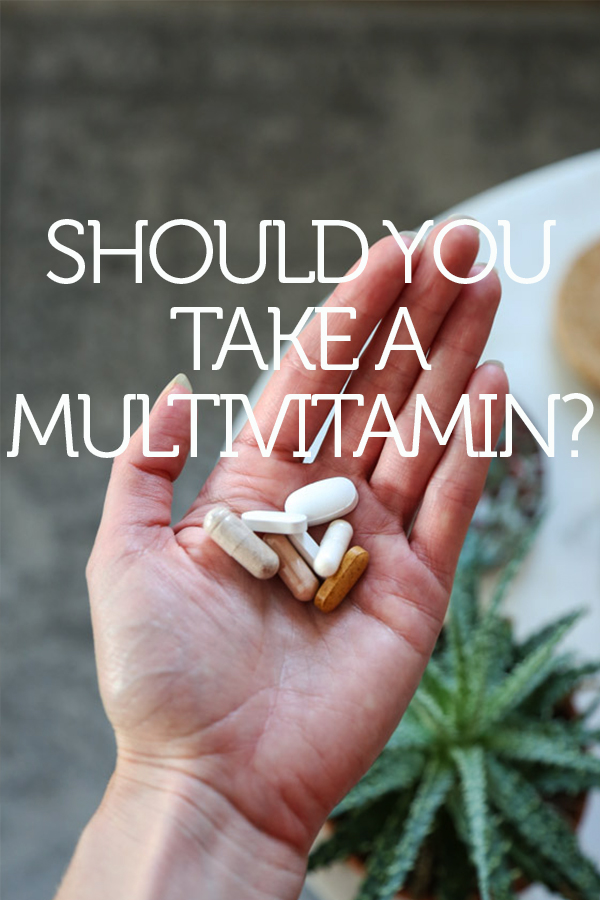
Though they may not be the meat of the 20 minute sessions, the Q&A’s that follow are usually the most informative for everyone involved—especially me. I love honing in on where people find themselves stumbling, which of the latest trends are front of mind, and what age old questions remain sources of confusion.
A subject that seems to be a cross-section of all of the above is supplements.
Which ones you should be taking. Whether they are snake oil in a tablet. And what the cheapest, most efficient options out there are to get a bang for your nutrient buck.
With convenience and price point top of mind, it’s no surprise that the single most frequent question I get asked at these sessions is: should I be taking a multi-vitamin?
My answer is multi-faceted. But in brief, like all nutrition plans, I’d say it really comes down to the individual’s needs.
Filling in the Gaps
For the average person, whose bloodwork is sound and doesn’t have much to complain about, a multi-vitamin could serve a useful purpose in filling in the gaps where your diet might be lacking.
Dr. Tieraona Low Dog, the author of Life Is Your Best Medicine: A Woman’s Guide to Health, Healing, and Wholeness at Every Age, and a frequent lecturer on the subject of vitamins and minerals, thinks every woman would benefit from a multi-vitamin. Even if you have a good diet, it’s unlikely that you’ll get all the nutrients you need every day, so taking a multivitamin makes sense for hedging your bets.
For maintaining vibrancy and keeping the engines chugging, a multivitamin is a great tool.
But for those of us who are autoimmune, or dealing with a host of specific health concerns, or have simply lost our vibrancy all together, a personalized approach may be more effective at bringing you back to your baseline.
If you’re seriously deficient in Vitamin D or B12, it’s unlikely that the small amounts in a multi-vitamin will make a difference. So how do you go about building a more advanced supplement regimen?
Making up for Deficiencies
If you’ve read my dissertation, The Wellness Project, then you know I am wary of doctors who prescribe bags upon bags of supplements.
It’s one of my main gripes with functional medicine in practice, as it’s just as easy to overmedicate with natural options as with big pharma. And ultimately many of your problems are going to be solved in the kitchen, not just by taking a pill.
During the height of my treatment with holistic practitioners, I was spending all my money on green juice and supplements with very little awareness for what was moving the needle or the “why” behind my spending. I had very real deficiencies and a need for the extra support. But I also had to occasionally wonder whether the supplements that gave me a boost on a physical level, were also making me feel sicker emotionally.
I had to buy three day-of-the-week pill cases just to keep up with my new regimen and switch to a larger purse to carry them all with me. Some supplements needed to be taken with meals, others on an empty stomach. As a result, I had to remember to take one capsule or another five times a day. It was a lot to wrap my head around. Especially a head already being addled by a special brand of Hashimotos dementia.
The process made me feel like a patient, 24/7.
This was one of the pain points that brought me to my project. But I haven’t necessarily shunned supplements since then. I do, however, always make sure these periods of heavier pill taking has a timeline and plan associated.
For example, this past fall, I started seeing a new functional doctor, who performed tests that ultimately diagnosed me with SIBO. That period of healing—much of the last 6 months—has involved herbal antibiotics and more supplements than I was apt to normally take. But I need them to support my digestion.
It’s important to note that as you heal your gut, the more nutrients your body will be able to take advantage of, via pill or otherwise.
When you’re suffering from SIBO, leaky gut, dysbiosis, or all of the above, you may not be able to absorb all the nutrients you’re consuming in food, which necessitates a more robust approach than a simple multi-vitamin. It also means, though, that you need to do the work and not solely rely on pills, since much of their contents may not even be reaching your bloodstream.
As my system healed, I let bottles run out, and restarted the process of finding my new multivitamin normal.
A Personalized Approach
Since transitioning from the triage stage back to on-going maintenance, I’ve been using Care/Of’s mail order system to supply my personalized vitamin packs that I can easily take with me everyday.
How it works is that you take a quiz, which covers everything from health history to how you’re currently feeling—sleep, stress, digestion, headaches, etc. You’re also asked practical questions like how many pills you want to take a day—for instance, if you’re on a budget or sick of throwing handfuls of supplements down your gullet, you can select under 4—and what size you prefer. For those who tend to choke on horse pills, they will give you your dose in two smaller ones!
The convenience and price factor are what blew me away most. Each assortment is packaged in a cute packet with your name on it, and housed in a convenient (and beautiful!) cardboard dispenser. No day-of-the-week cases necessary.
It might sound silly, but I can’t stress enough how big of an effect the packaging alone has had on my routine. It makes taking my vitamins fun, it makes packing for trips ten times easier, and most importantly, it makes me actually take my supplements. Without the sorting, or the prospect of swabbing at TSA, I’m much less likely to get lazy about popping my pills and just do it.
Instead of spending hundreds of dollars on various bottles, Care/of bills you a monthly fee based on the supplements in your pack. It usually ends up being closer to wholesale pricing than if you were to source everything individually yourself. Mine was $40 a month for my daily 6 pills. And you always have the option of removing or adding.
Care/of is also very transparent about where their ingredients are sourced from (not the case with most OTC vitamin companies). For example, the fish oil is from Wild Alaskan salmon, and their herbal supplements are all sustainably sourced. The recommendations are backed by a scientific advisory board, and you can also browse research studies that explain the “why” behind each pill in your pack, which as a minor in autoimmune studies, I appreciate.
In short, it’s been a game changer.
If you want to try your own personalized pack, take the quiz and you can get your first month for 25% off by using the code PHOEBE. Boxes start at $20 a month so you can try it out for just $15. You can’t beat that bang for your buck, in my opinion!
And best of all, if you’re one of those lucky vibrant folks who just needs to fill in the gaps, they offer a great multivitamin to get you started.
With health and hedonism,
Phoebe
Do you have any more specific questions about supplements or multivitamins? Let me know in the comments!
This post is brought to you in partnership with Care/of. As always, all opinions are my own. Thank you for supporting the brands that make this site and my on-the-go vitamin protocol possible.
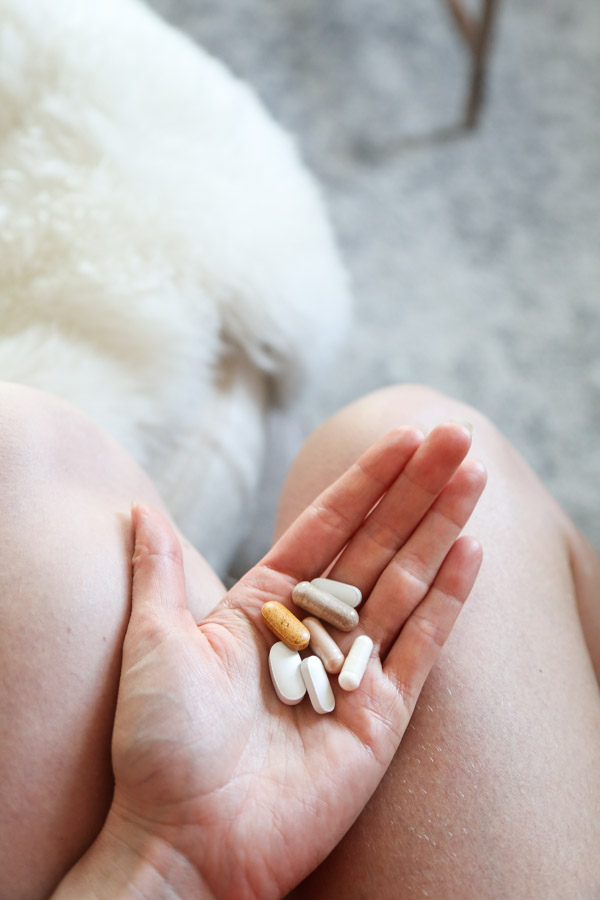
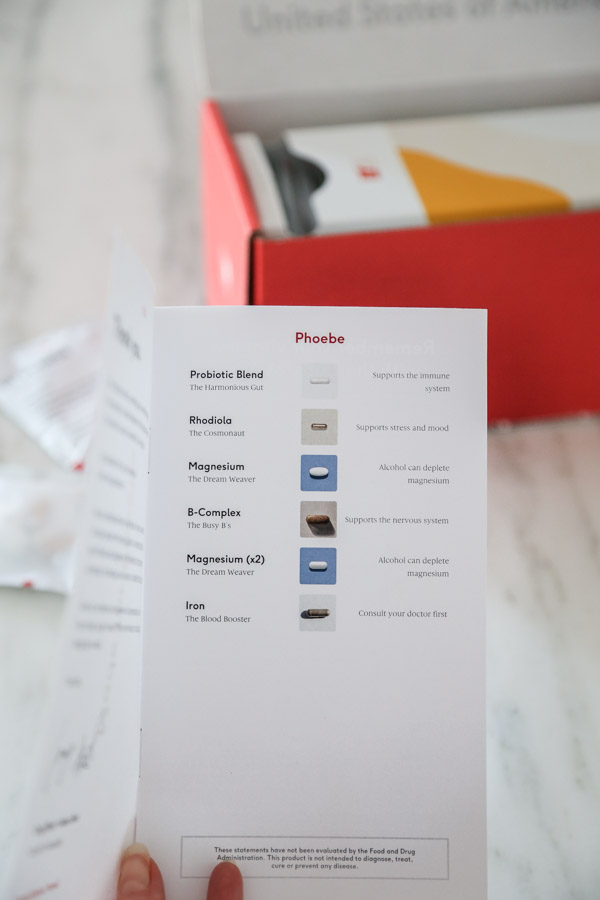
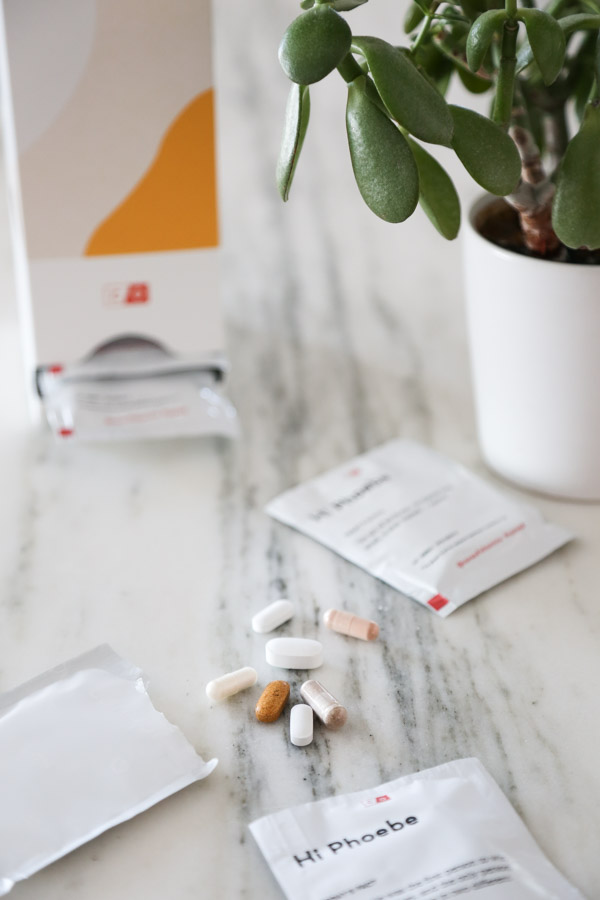
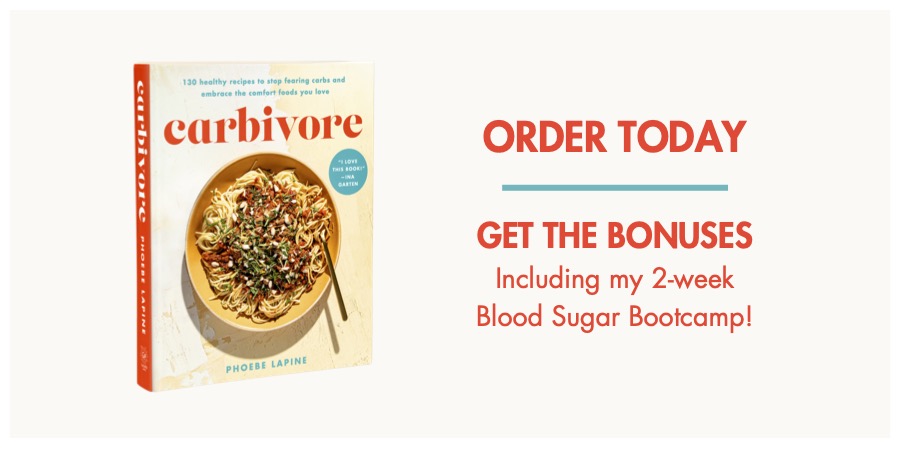
I have the same problem! I carry around all these used prescription bottles labelled B D F AM PM for the 5 different times a day I take various supplements – it takes me an hour just to collate my meds for a trip! I love the sound of Care/of. Maybe they can help me with telemarketers, too.
yup – that’s how I roll too
I love the idea of this–I guess I’m a little wary of the environmental sustainability of all those packets, though. I looked through their website and couldn’t find what they’re made of and if they’re recyclable. Certainly, staying healthy using the plastic and such that comes with vitamins in whatever form is always going to be less plastic than a hospital visit, but if there are ways to reduce, I’m all about that.
totally get it bridget. I add these packets to my soft plastic pile and recycle so I feel a little bit better about it. But yes, it’s not reducing the amount of plastic being produced in this world.
This is pretty ingenious. Could I put, or have other things put in, like turmeric?
I glanced through their site and couldn’t discover what they’re made of and in the event that they’re recyclable. Surely, remaining solid utilizing the plastic and to such an extent that accompanies nutrients in whatever structure is continually going to be less plastic than an emergency clinic visit, yet in the event that there are approaches to diminish.